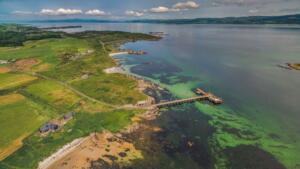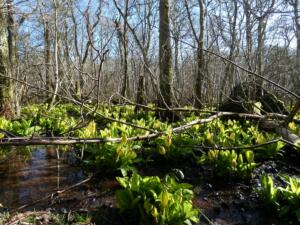
Grants
Tackling environmental threats
Ridding Gigha of skunk cabbage
£13,310 awarded
Grantee: Isle of Gigha Heritage Trust
Duration: 22 months (September, 2025 – June, 2027)
Background
Invasive non-native species (INNS) cause significant damage to Scotland’s ecosystems, in particular by outcompeting native species. Further social and economic impacts also arise, with the Scottish Invasive Species Initiative estimating an annual economic burden of £300 million a year.
Removing invasive species is a costly and resource-heavy task, requiring multi-million pound funding for landscape-scale eradication of species such as Rhododendron Ponticum. However, smaller amounts of funding, such as HIEF grants, can help to tackle INNS growth at early stages, or in strategic locations such as peninsulas and islands, where total eradication is viable.
The INNS, American skunk cabbage, is a growing problem in Scotland, particularly as it colonises areas of high conservation importance, such as wet, marshy woodlands.
The Project
The Isle of Gigha Heritage Trust was established in 2002, enabling the historic community buyout of the island. They support the community through social and economic development, managing assets such as renewable energy schemes, housing, and their local environment.
Through a Ranger Service, the Trust also undertakes conservation work throughout the island, initiating an INNS removal project in 2023. This successfully tackled 15ha of INNS, but more areas remain that require both initial targeting and re-targeting.
One of these areas, approximately 10.5 hectares of skunk cabbage, sits within the community-owned Achamore Gardens, woodland spaces, and agricultural and residential land.
This grant will support the removal project over two years, through a combination of Ranger Service work and specialist contractor visits.


Images, courtesy of Isle of Gigha Heritage Trust, show an aerial image of Gigha (left) and the invasive skunk cabbage (right).
